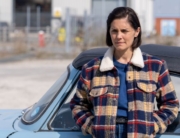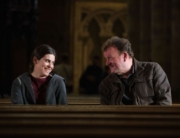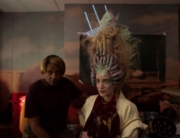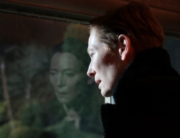With its jaunty score, recognizable ensemble cast, and handsome production design, Thea Sharrock’s Wicked Little Letters initially feels like a middling British charmer from the late aughts.
Loosely based upon real events, the story focuses upon two neighbors, Edith Swan (Olivia Colman) and Rose Gooding (Jessie Buckley), living in modest dwellings in a 1920s coastal village. They are the antithesis of each other. Edith resides with her two aging parents: pious, sour Edward (Timothy Spall) and prim Victoria (Gemma Jones). The family is strict and deeply religious—all sleep in separate beds in the same room. Rose, on the other hand, is a brash, free-spirited single mother with a young daughter, Nancy (Alisha Weir), and a boyfriend, Bill (Malachi Kirby).
When Edith starts to receive lewd, foul-language-laden letters, the family and law enforcement immediately pins it on Rose, landing her a stint in jail. Still, letters continue to be sent to Edith and others within the town, creating a mini-stir among the country. Skeptical cop Gladys Moss (Anjana Vasan) thinks there’s more than meets the eye, and goes rogue to solve the mystery.
Wicked Little Letters is presented as a comedy, with broad performances (lots of shouting fits or someone suddenly getting banged with a shovel). Spall, in particular, is a cranky caricature, a ball of spitty, pent-up macho anger. The handsome Hugh Skinner stretches facial tics as the cartoonish schmuck Constable Papperwick (an easy foil for the thoughtful, pragmatic Gladys). The film is occasionally amusing, especially at the outset, but the novelty of a movie aimed at a typical anglophile audience with uptight British people swearing and reading vulgar words written in crisp calligraphy eventually wears thin. (If there had been more than one scene of the “fuck”-laden speech therapy session in The King’s Speech, it would have been redundant.) However, the film takes a more disquieting turn once the true poison pen letter writer is revealed. The film has a feminist angle as well, which buoys what could otherwise be trite subject matter.
As one who wasn’t convinced by Buckley as the younger version of Colman in the acclaimed The Lost Daughter, it’s a change of pace to see them reunited here as opposites. Their characters both face stifling societal oppression that is literal in the storyline, but also in some of the film’s framing, when they are behind bars or window panes, elegantly shot by Ben Davis (The Banshees of Inisherin). Buckley is colorful as the rollicking Irish Rose, despite having some dramatic scenes with her daughter that are somewhat predictable and treacly. The script by Jonny Sweet is overall fairly rote, with creaky tonal shifts, yet Wicked Little Letters is worth catching for those admiring of a great performance: Colman continues to be one of the most captivating actresses today. Her demeanor, reactions, and vocal inflections are continuously surprising, all while crafting a character that becomes far more three-dimensional and ambivalent, almost unnervingly so, than expected.

















Leave A Comment